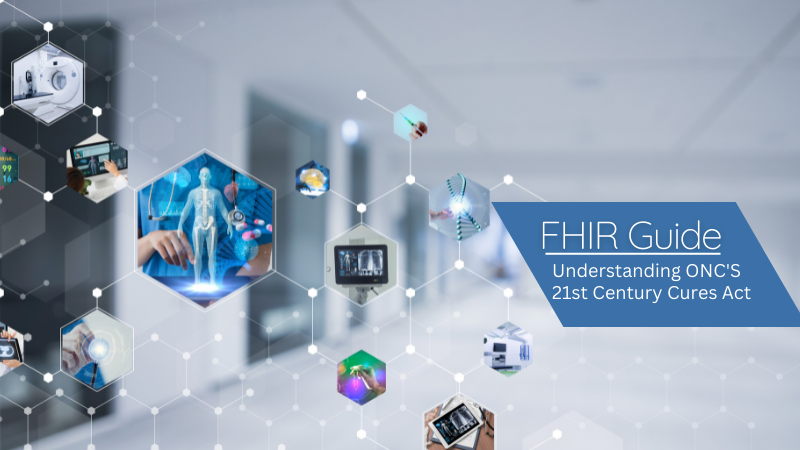ONC’s 21st Century Cures Act – Improving Data Interoperability
ONC’s 21st Century Cures Act – Improving Data Interoperability
Health Level 7® (HL7) Fast Healthcare Interoperability Resources® (FHIR) has been identified as the foundational standard for health data exchange, supporting the 21st Century Cures Act rule at 45 CFR 170.215. FHIR provides the data standards for internet data exchange via secure application programming interfaces (APIs), regardless of proprietary data formats or EHR sponsored operating systems. HL7, an international standards organization, also identifies the guidelines for healthcare organizations to share and process information between systems in a uniform and consistent manner.
As the Cures Act, signed into law on December 13, 2016, becomes increasingly enforced, payors, providers, labs, pharmacies, and clinics are increasingly obligated to comply with patient’s rights to ubiquitous access to their health information.
New Opportunities For Leveraging Healthcare Data On The Horizon
This new vision for the healthcare ecosystem can be achieved through close coordination by payers, providers, and regulators in promoting innovative and scalable technologies. Today, hospitals, clinics, labs, pharmacies, and insurance carriers each have records of a patient’s medical history, however, their computer systems don’t have the ability to share this information due to proprietary data formats and disparate operating systems. The current healthcare IT ecosystem is akin to the travel and eCommerce industries prior to the application programming adoption of open APIs.
Federal regulators have set the direction for evolution of the Healthcare IT ecosystem by mandating the exchange of healthcare data and allowing patient access to their claims and encounter information. These mandates may be viewed as a burden to some organizations, but strategically oriented organizations realize that improved data interoperability will open opportunities for leveraging data to more advanced analytics, population health and continued care coordination.
Government FHIR Policies and Mandates Have Already Begun
In late 2020, The Centers for Medicare & Medicaid Services (CMS), began publicly reporting eligible clinicians, hospitals and critical access hospitals that may be information blocking based on how they attested to certain Promoting Interoperability Program requirements. Additionally, publicly reporting those providers who do not list or update their digital contact information in the National Plan and Provider Enumeration System (NPPES).
Likewise in 2021 a mandate was instituted for qualified payers to implement and maintain a secure, standards based (HL7 FHIR) API that allows patients to easily access their claims and encounter information, including cost, as well as a defined subset of their clinical information through third-party applications of their choice. Additionally, CMS requires qualified providers to make their directory information publicly available, and for the exchange of certain patient clinical data to be shared through a standards-based Payer-to-Payer Data Exchange.
Let Our FHIR Architects Guide You
As the 21st Century Cures Act takes hold, and interoperability within the healthcare ecosystem matures, other mandates will be issued and enforced. GigaTECH has the experience and expertise to assist the industry in navigating the regulations, developing secure and compliant software applications, training your team from the executive level to your development team, and negotiating the cross-FHIR of interoperability.


